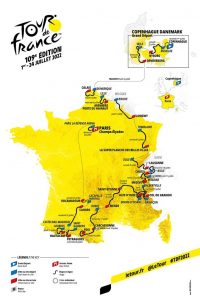Tour de France 2022 Kicks off in Copenhagen
The route for the 2022 Tour de France was revealed at the Palais des Congrès in Paris last week, with the Grand Depart taking place in the Danish capital of Cophenhagen.
The riders will set off on the 1st July, and the occupancy of the yellow jersey will be decided at the end of the month when the race concludes on the Champs Élysées in Paris on the 24th July.
Nine out of ten Danes are said to own a bike, and cyclists in Copenhagen cover the equivalent distance of 400 editions of the Tour de France every week day – that’s about 1,440,000km. Therefore, it is fitting that that a country as enthusiastic as Denmark will host the opening three stages of the 2022 Tour de France.

The first 13km will see an opening individual time trial return for the first time since 2017 when Geraint Thomas claimed victory in Düsseldorf. The riders will then spend the next 400km or so meandering through the countryside along the length of the notoriously wind-swept east coast of Denmark, finishing in Sønderborg. There is then a rest day to allow for the transfer over to France.
After stage four between Dunkirk and Calais, cobblestones return to the Tour de France on stage 5. The undoubted first flashpoint of the Tour looks set to be the cobbled stage to Arenberg Porte du Hainaut, which previously hosted stages in 2010 and 2014. Starting in northern France’s largest city, Lille, eleven cobbled sectors are crammed into the final 75km of the stage, with sectors ranging from 1.3 to 2.8km in length and totalling 19.4km. The general classification contenders must stay wary here, and the Paris-Roubaix specialists will be looking to gain an advantage on this gruelling stage.
Moving onto stage six, riders will have to tackle the longest route of the Tour, commencing in Binche and finishing 220km away in Longwy.
Stage seven could prove to be another pivotal point in the race with the infamous La Planche des Belles Filles featuring for the sixth time. The final metres of the 7km climb take place on a gravelled ramp, which reaches a pain-staking 24% gradient.
This first significant climb will serve as an appetiser for the subsequent few stages as the race moves into Switzerland, and more importantly, the Alps. Stage 10 and 11 will serve as crucial to the general classification riders, with the former intersected by a tiresome ascent to the Megève altiport; the final 21 kilometres take place on uphill terrain. Stage 11 features an infamous trio of climbs: the Col du Télégraphe, Col du Galibier and Col du Granon. The final ascent averages a gruelling 9.2% over 11.3km.
July 14th, which is Bastille Day in France, will see the return of L’Alpe d’Huez for the first time since 2018. In what exists as one of the most famous climbs in Tour de France history, it always serves as an interesting test with an average gradient of 7.9% and lasting 13.5km.
https://www.youtube.com/watch?v=3fcWbS9m5F0
There is a chance for the sprinters to make their mark after a tough second week of climbing. The battle for the green jersey resumes in stage 13 in Saint-Etienne, before Carcassonne hosts a hilly stage 15 that will favour the breakaway sprinters.
A return to a punishing climbing schedule sees stage 17 pack four categorised climbs into the final 75km, before stage 18 presents an even tougher proposition; the Hautacam returns to the Tour de France for the first time since 2014, which averages 7.8% over 13.6km. The Hautacam is preceded by the Col d’Aubisque (16.4km, 7.1%) and Col de Spandelles (10.3km, 8.3%).
For the third year in a row, the penultimate stage of the race will close with a time trial. The 40km route will certainly test the resolve of the riders after three weeks of racing prior. The dipping hills of the Causses du Quercy national park will prove an unwanted challenge with two 1.5-kilometre climbs coming inside the final five kilometres, including one up out of the Alzou Valley to the finish in Rocamadour.
The race will then of course conclude on the Champs Élysées as it has done since 1975, with the victor having already been decided by this point. Rather significantly, the conclusion of the men’s race will allow for the first women’s edition since 1989 to begin in Paris.






























